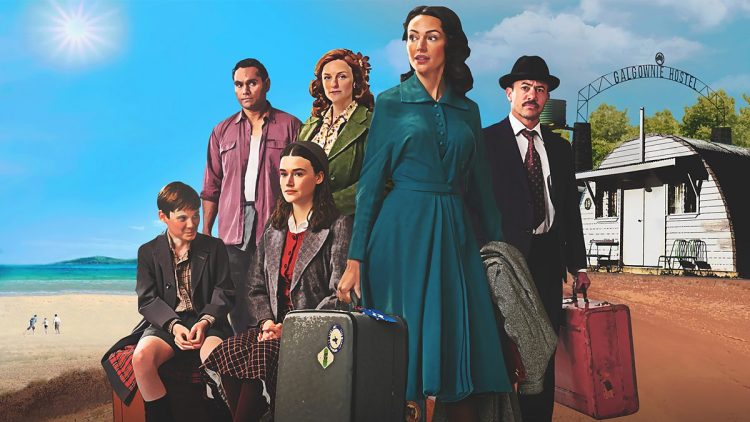
Aussies won’t like this series, I guarantee it. A six-parter about hopeful British migrants promised a better life in Australia in the 1950s, it depicts Aussies as racist misogynists and the British newcomers as enlightened and classless.
We are halfway through this Sunday night series here in the UK on BBC1 and its reception has been shall we say luke-warm. ‘A hilariously watchable drama in which no Australian cliché was left unturned’ said The Times; ‘. . . a burst of sun-soaked schmaltz’, The Independent.
Written by a Brit, it looks fantastic, and it touches on some familiar themes, in particular the contrast between the almost aggressive informality of the Aussies and their mockery of the ‘stuck-up’ poms. But as many people have pointed out some of the attitudes, of the British migrants in particular, are more 2023 than 1955. That a British woman should be shocked to see an Aboriginal woman shoved to the end of a queue in a department store, and then respond to a (hyper-) racist Aussie’s comment that ‘Abos’ were not humans with ‘they were here long before you were’ is frankly pretty unconvincing, as is the fact that the only white man who is prepared to talk to the Aboriginal worker is a British migrant. And all this in the time of Windrush, when it was not unusual in England to see signs saying ‘No blacks, no Irish’ on the windows of boarding houses.
Then there are the anachronisms: being able to pick a phone and call England at the drop of a hat (I remember having to book a long-distance phone call days ahead); use of words and phrases such as ‘the UK’, ‘I was like’, ‘Oh my days’ and I think I heard one of them refer to ‘Brits’.
There’s some excellent acting in Ten Pound Poms, particularly from Warren Brown as the conflicted Terry, David Field as the foul-mouthed, but utterly believable Dean and Faye Marsay as Terry’s wife Annie. But all in all, to quote The Spectator ‘ . . . it also left you wondering if Ten Pound Poms has fully decided what kind of show it wants to be: a thoughtful and well-researched microcosmic portrait of what happened to the hundreds of thousands of ordinary postwar British people who moved to Australia, or an incident-packed Sunday-night melodrama.’
I was a ten pound pom, back in 1968, albeit in very different circumstances. As the daughter of an Australian mother half my family was there – not that I met many of them until much later – including and in particular my brother, who was also a ten pound pom. I lived in Sydney mostly and I was not aware of the racism, not until I ventured inland. That’s not to say people living in the bush are more racist, just that I never came across Aboriginal people in Sydney and nobody ever talked about them. (It’s very different now.) I was aware of the term ‘whingeing pom’ and a certain defensiveness that defied the newcomer to cast any kind of aspersions on their new home, but otherwise I encountered very little resentment. In fact as an actress arriving from the Old Country I found it remarkably easy to find work (like so many other things, that changed as time went on, both the attitude and the availability of work) and I found Australians the friendliest people on earth.
So the comment that echoes my own thoughts are from The Evening Standard: ‘I couldn’t help feeling there would be enough drama in the events as they happened – the culture shock, the separation from home, friends and family – without the addition of the big secrets, lies and shocking events forced on the characters.’
It is much harder to do the first than the second of course. The soap opera elements of Ten Pound Poms are annoying distractions from the much more complex, harder-to-define issue of migration and the subtle yet colossal differences between our two countries. It has taken me three books to begin to describe this from my own point of view.
All that said, it seems the ten pound pom story comes as a surprise to a lot of folk over here, so on the whole it’s good to see it on prime-time television.

Nice review Patsy. The series has had some advertising here but on the basis of this I won’t be rushing out to get a Stan streaming account so I can watch it! I am actually a bit tired of the British stereotype of Australians that seems to have been around for years. I remember being confronted by hearing Julieanne White speak in a 1984 episode of Minder. I knew her in amateur theatre and at Uni in Melbourne in the late ’70s. She was playing an Aussie shoplifter with such a broad accent I was momentarily confused about whether it was really her. And I recently heard the same accent from every “Australian” in that notorious episode of The Crown season 4. It’s true that it has existed in reverse – unsympathetic British authority figures with Oxford accents have loomed large in Australian historical dramas, but I think we see much less of it now. Or am I imagining it and are extreme cultural stereotypes (so often marked by accents and offensive attitudes) just easy material for screen writers?
Thanks Nick for your insightful comments. It seems stereotyping is still alive and well on this side of the world. I am embarrassed to see how Aussies are portrayed by our (British) screenwriters. The racist stereotype in Ten Pound Poms, brilliantly played by David Field, does exist I’m sure and in some ways he is the most interesting character in the whole series, though his extreme behaviour is really only there to provide instant conflict and the innocent British viewer could well think he’s typical when he’s not. That’s television for you I guess.